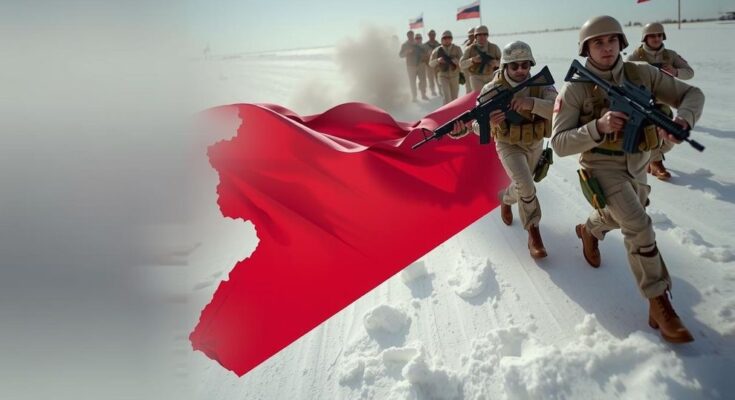Following the removal of President Bashar al-Assad, Russia is reducing its military presence in Syria but will retain its significant military bases. Diplomatic discussions are ongoing in Jordan to pursue a peaceful political transition in Syria, amidst concerns about extremist influences among new leaderships. Meanwhile, violent incidents involving the Islamic State persist, and Israel continues to conduct military strikes within Syrian territory.
Russia is reportedly scaling back its military presence in Syria, particularly from front line areas and the Alawite Mountains, without completely withdrawing from its key bases in the country. Sources indicate that Russia is repositioning forces after the recent overthrow of President Bashar al-Assad, although its bases at Hmeimim airbase and Tartous naval facility will remain operational. The situation unfolds against a backdrop of heightened diplomatic activity involving top diplomats from various countries, who are convening to discuss Syria’s future and support a peaceful transition of power.
In the Jordanian city of Aqaba, diplomats from eight Arab states expressed their commitment to a peaceful transition in Syria under United Nations and Arab League oversight. They emphasized the importance of inclusivity and representation of all political and social factions in any future governance. Amid this, some diplomats raised concerns regarding the potential influence of extremist elements among the newly empowered forces following Assad’s downfall.
Concurrently, reports of violence continue as Islamic State terrorists reportedly killed six shepherds in Syria’s desert region. This incident highlights ongoing security challenges, as IS cells remain active despite the turmoil surrounding Assad’s regime. Furthermore, Israel has intensified its military operations, targeting various sites within Syria in a response to the changing power dynamics and perceived threats. Despite these uncertainties, the international community, led by the UN envoy, is advocating for the stability of critical state institutions to prevent a complete collapse of governance in Syria.
Turkey, having been a key player in the Syrian conflict, is set to reopen its embassy in Damascus, signaling a shift in its diplomatic approach following Assad’s removal. This evolution could signify broader changes in alliances and interactions among regional powers as post-Assad Syria begins to take shape. With increased international engagement and the call for humanitarian assistance, the future trajectory of Syria remains uncertain, raising questions about the protection of rights for vulnerable groups, including women.
The geopolitical landscape in Syria has been tumultuous, particularly following the recent ousting of President Bashar al-Assad by Islamist-led rebels. This transition has prompted concerned nations to engage diplomatically to ensure a stable and inclusive future for Syria. The involvement of Russian military forces has long been pivotal in supporting the Assad regime, and their current repositioning signals a shift in operational dynamics. Furthermore, as the international community pivots towards facilitating a new governance structure in Syria, underlying concerns about extremist factions arising from the conflict loom large, particularly regarding their influence within the new order.
The recent developments in Syria underline a significant transition period marked by the fall of President Bashar al-Assad and the subsequent response from regional and global powers. With Russia adjusting its military presence while maintaining its strategic bases, the emphasis on a peaceful and inclusive transitional government raises hopes yet also concerns regarding the potential for extremist influences. Diplomatic engagements among key stakeholders present an opportunity for a new governance framework, but the security challenges and humanitarian issues in the aftermath of the regime’s collapse remain critical points of attention. The future of women’s rights and the overall stability of the region will be pivotal as these new dynamics unfold.
Original Source: www.france24.com




